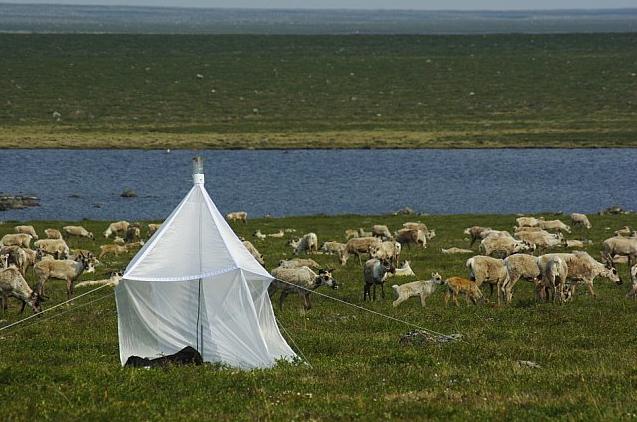Summary
This project is investigating the influence of oestrid (nasal bot and warble) fly harassment on the behaviour and distribution of Bathurst caribou. Given the current decline of the Bathurst barren-ground (Rangifer tarandus groenlandicus) herd in the Northwest we will investigate whether conditions on the post-calving/summer range may be contributing to the decline. Summer is a critical time for caribou to support calves & replenish protein & energy reserves. One factor that may preclude the ability of caribou to obtain adequate forage is harassment by biting & parasitic insects, including oestrid flies, mosquitoes, & black flies. Insect harassment alters habitat use and activity budgets of caribou, potentially leading to reduced forage intake and elevated energy expenditures. In this project we will develop an empirically-based index that relates oestrid activity to weather, habitat, time of day and time of year.
Our work will involve:
• Data collection during six sampling sessions July-August 2007 & 2008.
• CO2-baited Malaise traps to collect insects at 2-hr intervals and portable weather station and light meter to record weather variables at 10-min intervals.
• Count models to analyze activity/abundance of mosquitoes & black flies relative to weather and temporal variable. We will use a logistic regression to model presence/absence of oestrid flies.

Insect trap and caribou (L. Witter)
Results
The follows summarizes some of our preliminary results:
Insect abundance/activity strongly influenced by temporal variables:
- Time of day
• Mosquitoes less active during midday; most active 18:00-24:00 hrs.
• Black flies least active 0:00-6:00 hrs.
• Potentially important for oestrids, however, low sample size & high degree of variability make interpretation difficult.
- Date
• Mosquito activity peak early July; negligible mid/late July.
• Black fly activity peak mid July to early August.
• Probability of oestrid presence significantly related to number of days since predicted emergence; likely present until 25 days post-emergence (late August for yrs studied).
• Weather appeared to be less important than temporal variables in explaining insect activity/abundance levels.
- In the future, a two-stage modeling approach will be explored to separate factors affecting insect presence/absence from those important in determining insect activity levels given presence.
- Better understanding of weather variables will help illuminate potential effects of climate change on insect activity/abundance levels.
• Additional field data collection and model improvement are planned.
- Current models over-predict mosquito and black fly numbers at low insect activity; under-predict at high activity levels.
- Models of oestrid presence are highly predictive (ROC scores 0.8-0.9), however, utility is questionable due to low number of trapping periods (11 of 285) when oestrid flies were caught.
• Future work will define fine-scale relationships between caribou behaviour & insect activity/abundance; identify landscape-scale patterns of caribou movement as related to forage quality/availability, vegetative phenology, & insect indices; quantify energetic costs of insect avoidance & examine implications for caribou population productivity.
Applications
It is important to understand the major enegtetic relationships that impact the health and body condition of large migratory caribou herds. The Bathurst herd is declining and it is important to determine the linkage between summer range ecology and herd productivity.
Reports
PowerPoint of project can be downloaded
Leslie Witter's Master's thesis: download (1.09MB)
Contacts
Leslie Witter, Graduate Student
Ecosystem Science & Management Program
University of Northern British Columbia
3333 University Way
Prince George, B.C.
V2N 4Z9
leslie_witter 'at' yahoo.com
Chris Johnson, Assistant Professor
Ecosystem Science & Management Program
University of Northern British Columbia
3333 University Way
Prince George, B.C.
V2N 4Z9
Phone: (250) 960-5357
johnsoch 'at' unbc.ca
